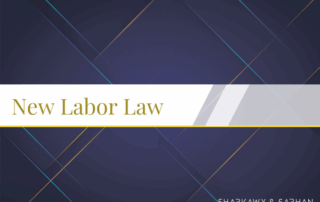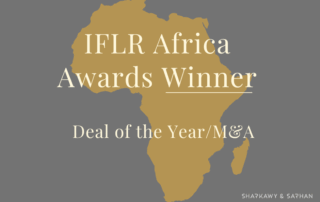5th of June, 2017
Egypt’s New NGOs Law – More Restrictions & Harsher Penalties
By: Dalia Abdelghany
Keywords: Commercial, NGOs
Have you been waiting for the issuance of a new NGOs Law with the hope that it will make operations easier for civil society in Egypt? Unfortunately, Law 70/2017 issuing the Law for Regulation of Non-Governmental Organizations and Foundations Operating in Civil Society has published on 24 May 2017 (the “New Law”). It provides a more restrictive approach on the way civil society operates in Egypt. It establishes a new quasi-security authority and widens the authority of the government on civil society and puts more restrictions on its operations, resources and activities. Moreover, the Law severely harshens the penalties for violating the Law. Existing NGO must adjust their situation before 25 May 2018.
Here is all what you need to know about the New Law.
Security Authorities and Roles Are Now Formalized:
• The Authority: The New Law introduces a new National Authority for Regulating the Operations of Foreign NGOs work (“The Authority”). The Authority shall be responsible for all matters related to foreign NGOs’ work in Egypt. This includes granting incorporation permits, supervising activities, approving the receipt of funds, as well as deciding on all forms of cooperation between foreign NGOs and Egyptian entities. The Authority shall also be responsible for receiving notifications regarding grants received by local NGOs.
• This is not entirely new, since any acts/applications submitted by an NGO was typically run by security authorities first before receiving clearance. However, in the past, this had no foundation in the applicable laws and regulations. It was merely practice. The New Law now formalizes the role of security authorities in the NGOs’ operations.
• The Authority shall be formed from representatives from the Ministries of Foreign Affairs, Defense, Justice, Interior, International Cooperation and Social Solidarity as well as representatives from the General Intelligence, the Central Bank of Egypt (CBE), the CBE Money-Laundering Unit and the Administrative Control Authority.
• The New Law bans NGOs from conducting polls or field surveys without taking permission from the Authority, which shall make sure of its unbiased content!
• The New Law imposes on foreign and local NGOs a lot of reporting duties to the Authority and/or the relevant social solidarity department, as the case may be.
• Furthermore, the NGO is now obliged to obtain the Authority’s approval before any cooperation or partnership with foreign or local NGOs, even if such partnership does not involve donations or grants.
Stricter Governance:
• Any juristic person carrying out activities that fall within the objectives of non-governmental organizations or foundations without taking the legal form of a non-governmental organization or foundation according to the provisions of the New Law shall be subject to the supervision of the Ministry of Social Solidarity “MOSS” and be deemed as being governed by the New Law. The Penalty for setting up a legal form other than an NGO to carry out activities subject to the New Law has been severely increased and may reach five years of imprisonment.
• MOSS shall have the right to request from local NGOs to withdraw any administrative decision within 30 days from being notified of the decision, if it sees that such decision violates the New Law or the articles of association of the local NGO. The local NGO shall withdraw the decision within 7 days from the date of receiving the request, otherwise the decision shall be considered cancelled.
NGOs Are Now Supervised by the Accountability State Authority:
• Except foreign NGOs, all NGOs’ shall now be subject to supervision of the Accountability State Authority (“ASA”). It is not clear how this will operate in practice, as the ASA Law does not address NGOs. This will likely entail the submission of the financials to the ASA and the ability of the ASA to review and comment on these financials for the least.
Incorporation:
• Founders and members: Membership and establishment of an organization or foundation is now limited to Egyptian juristic persons and natural persons. As an exception to this, foreign natural persons who have residency in Egypt may participate as members or members of board of directors in the organization with a maximum percentage of 10% of an organization’s membership. On the other hand, establishing a foundation is strictly limited to Egyptian natural or juristic persons.
• Capital: The minimum allocated capital for establishing foundations is now set to (EGP50,000). While the practice has been giving a discretionary authority to the relevant social solidarity directorate (“SSD”) to determine the minimum allocated capital for foundations according to the nature of its activities, and while the SSD used to request a minimum capital of EGP 10,000, it has now been formalized with an exceedingly increased amount.
• Special license for operating in certain areas: the local NGO has to take permission before conducting any activities in border areas that shall be determined by the Prime Minister.
Funding:
• Receiving donations from Egyptian persons or entities situated in Egypt is still permission free. The local NGO would only be required to notify MOSS within a specific time duration that will be determined by the executive regulations, which is yet to be issued. However, the New Law requires that the NGO submit a regular bank statement with the accounts to MOSS.
• Accepting cash exceeding EGP10’000 by an NGO is no longer acceptable, except via a bank check or a bank deposit in one of the regulated banks in Egypt. Rules governing receiving in-kind donations will be further regulated under the executive regulations.
Receiving donations from foreign persons or entities situated in Egypt requires an approval, rather than a notification as was the case before the New Law. The local NGO must notify the Authority within 30 days from the date of receiving the money. The Authority has the right to object to the funding within 60 days of receiving the notice. If the Authority did not respond to the request of the NGO within 60 days, the NGO shall consider this as a rejection. The NGO shall not have the right to spend the money before obtaining the necessary approval from MOSS. If the local NGO violates the provisions regulating the funding, MOSS shall have the right to suspend the local NGO’s activities for one year, request the dissolution of the local NGO or request the removal of the local NGO’s board from the competent court.
• Similarly, receiving donations from Egyptian persons or entities situated outside Egypt, whether from an Egyptian person or entity or from a foreign entity or person requires an approval, rather than a notification as was the case before the New Law. The local NGO must notify the Authority within 30 days from the date of receiving the money. The Authority has the right to object to the funding within 60 days of receiving the notice. If the Authority did not respond to the request of the NGO within 60 days, the NGO shall consider this as a rejection. Again, the NGO shall not have the right to spend the money before obtaining the necessary approval from MOSS. If the local NGO violates the provisions regulating the funding, MOSS shall have the right to suspend the local NGO’s activities for one year, request the dissolution of the local NGO or request the removal of the local NGO’s board from the competent court.
• Fundraising still requires approval from MOSS thirty days prior to the fundraising date.
Increasing Gov’t Fees:
• The New Law requires that the local NGO pays a one-time fee of up to maximum EGP10,000 to the Fund for registration. Before the New Law. the fee used to be EGP100.
• One per cent of any grant or of the money collected through a fundraising permit will now go to the Fund for Assisting Non-Governmental Organizations and Foundations.
• Foreign NGOs will now pay a hefty annual registration fee to operate in Egypt (as shown below).
The Regulation of Foreign Employees, Consultants & NGOs Operating In Egypt:Penalties:
• Appointing Foreign Experts: local and foreign NGOs subject to the Law may not hire foreigners whether as experts, permanent or temporary employees or as volunteers except after obtaining a permit from the Authority in accordance with the executive regulation of the Law.
• The Law also bans local and foreign NGOs from concluding any agreement with any foreign entity (whether inside or outside Egypt) before notifying the Authority and obtaining permission in this regard.
• Foreign NGOs who are not associated with a foreign government, political party or any foreign syndicate may be allowed to practice one or more of NGO activities, subject to the Law. The maximum duration for the permit is three years that can be renewed. The Law imposes a fee that does not exceed EGP300’000 or its equivalent in USD as determined by the regulator, for obtaining, renewing or modifying the NGO’s permit. Such fee increases by 20% every five years. The executive regulation will determine the tranches of NGOS and the means of payment.
• The activities of the foreign NGO must be consistent with the priorities and needs of the Egyptian society, and in accordance with the development plan. This sets a discretion on the approving authority to decide whether Egypt needs the activities of the foreign NGO or not and, hence, reject the application. The foreign NGO is prohibited from practicing any activity of a political nature, against the public order or harmful to the national security of the country.
• Foreign NGOs who have a permit to work in Egypt and who have a general permit to transfer money into Egypt will still have to obtain the Authority’s permission on a case-by–case before transferring any funds or donations designated to execute activities or projects in Egypt to any person, organization, entity or association inside or outside Egypt.
• The foreign NGO shall not practice any activity or cooperate with any entity in Egypt by any mean except after obtaining permission from the Authority.
• Employment relationships between Foreign NGOs and their employees are now subject to the Egyptian Labour Law. In addition, and any disputes arising from them will be subject to the jurisdiction of Egyptian courts. Any agreement to the contrary will be invalid.
Penalties:
• While the maximum penalty in Law 84/2002 was imprisonment for one year and a fine of not more than EGP 10,000, the New Law has introduced harsher penalties and added new crimes.
• The penalties in the New Law range from one to five years of imprisonment, and fines between EGP20,000 to EGP one million.
• Newly introduced crimes include cooperating with foreign NGOs to operate in Egypt before obtaining the necessary permit and conducting polls or field surveys without taking permission from the competent authority.
• The Law also imposes penalties on banks and brokers who facilitate the receipt of funds by NGOs in violation of the provisions of the Law and on any juristic or natural person who granted permission to any entity to practice activities that fall within the scope of the Law.
Security Authorities and Roles Are Now Formalized:
• The Authority: The New Law introduces a new National Authority for Regulating the Operations of Foreign NGOs work (“The Authority”). The Authority shall be responsible for all matters related to foreign NGOs’ work in Egypt. This includes granting incorporation permits, supervising activities, approving the receipt of funds, as well as deciding on all forms of cooperation between foreign NGOs and Egyptian entities. The Authority shall also be responsible for receiving notifications regarding grants received by local NGOs.
• This is not entirely new, since any acts/applications submitted by an NGO was typically run by security authorities first before receiving clearance. However, in the past, this had no foundation in the applicable laws and regulations. It was merely practice. The New Law now formalizes the role of security authorities in the NGOs’ operations.
• The Authority shall be formed from representatives from the Ministries of Foreign Affairs, Defense, Justice, Interior, International Cooperation and Social Solidarity as well as representatives from the General Intelligence, the Central Bank of Egypt (CBE), the CBE Money-Laundering Unit and the Administrative Control Authority.
• The New Law bans NGOs from conducting polls or field surveys without taking permission from the Authority, which shall make sure of its unbiased content!
• The New Law imposes on foreign and local NGOs a lot of reporting duties to the Authority and/or the relevant social solidarity department, as the case may be.
• Furthermore, the NGO is now obliged to obtain the Authority’s approval before any cooperation or partnership with foreign or local NGOs, even if such partnership does not involve donations or grants.
Stricter Governance:
• MOSS shall have the right to request from local NGOs to withdraw any administrative decision within 30 days from being notified of the decision, if it sees that such decision violates the New Law or the articles of association of the local NGO. The local NGO shall withdraw the decision within 7 days from the date of receiving the request, otherwise the decision shall be considered cancelled.
NGOs Are Now Supervised by the Accountability State Authority:
• Except foreign NGOs, all NGOs’ shall now be subject to supervision of the Accountability State Authority (“ASA”). It is not clear how this will operate in practice, as the ASA Law does not address NGOs. This will likely entail the submission of the financials to the ASA and the ability of the ASA to review and comment on these financials for the least.
Incorporation:
• Capital: The minimum allocated capital for establishing foundations is now set to (EGP50,000). While the practice has been giving a discretionary authority to the relevant social solidarity directorate (“SSD”) to determine the minimum allocated capital for foundations according to the nature of its activities, and while the SSD used to request a minimum capital of EGP 10,000, it has now been formalized with an exceedingly increased amount.
• Special license for operating in certain areas: the local NGO has to take permission before conducting any activities in border areas that shall be determined by the Prime Minister.
Funding:
• Receiving donations from Egyptian persons or entities situated in Egypt is still permission free. The local NGO would only be required to notify MOSS within a specific time duration that will be determined by the executive regulations, which is yet to be issued. However, the New Law requires that the NGO submit a regular bank statement with the accounts to MOSS.
• Accepting cash exceeding EGP10’000 by an NGO is no longer acceptable, except via a bank check or a bank deposit in one of the regulated banks in Egypt. Rules governing receiving in-kind donations will be further regulated under the executive regulations.
Receiving donations from foreign persons or entities situated in Egypt requires an approval, rather than a notification as was the case before the New Law. The local NGO must notify the Authority within 30 days from the date of receiving the money. The Authority has the right to object to the funding within 60 days of receiving the notice. If the Authority did not respond to the request of the NGO within 60 days, the NGO shall consider this as a rejection. The NGO shall not have the right to spend the money before obtaining the necessary approval from MOSS. If the local NGO violates the provisions regulating the funding, MOSS shall have the right to suspend the local NGO’s activities for one year, request the dissolution of the local NGO or request the removal of the local NGO’s board from the competent court.
• Similarly, receiving donations from Egyptian persons or entities situated outside Egypt, whether from an Egyptian person or entity or from a foreign entity or person requires an approval, rather than a notification as was the case before the New Law. The local NGO must notify the Authority within 30 days from the date of receiving the money. The Authority has the right to object to the funding within 60 days of receiving the notice. If the Authority did not respond to the request of the NGO within 60 days, the NGO shall consider this as a rejection. Again, the NGO shall not have the right to spend the money before obtaining the necessary approval from MOSS. If the local NGO violates the provisions regulating the funding, MOSS shall have the right to suspend the local NGO’s activities for one year, request the dissolution of the local NGO or request the removal of the local NGO’s board from the competent court.
• Fundraising still requires approval from MOSS thirty days prior to the fundraising date.
Increasing Gov’t Fees:
• The New Law requires that the local NGO pays a one-time fee of up to maximum EGP10,000 to the Fund for registration. Before the New Law. the fee used to be EGP100.
• One per cent of any grant or of the money collected through a fundraising permit will now go to the Fund for Assisting Non-Governmental Organizations and Foundations.
• Foreign NGOs will now pay a hefty annual registration fee to operate in Egypt (as shown below).
The Regulation of Foreign Employees, Consultants & NGOs Operating In Egypt:Penalties:
• Appointing Foreign Experts: local and foreign NGOs subject to the Law may not hire foreigners whether as experts, permanent or temporary employees or as volunteers except after obtaining a permit from the Authority in accordance with the executive regulation of the Law.
• The Law also bans local and foreign NGOs from concluding any agreement with any foreign entity (whether inside or outside Egypt) before notifying the Authority and obtaining permission in this regard.
• Foreign NGOs who are not associated with a foreign government, political party or any foreign syndicate may be allowed to practice one or more of NGO activities, subject to the Law. The maximum duration for the permit is three years that can be renewed. The Law imposes a fee that does not exceed EGP300’000 or its equivalent in USD as determined by the regulator, for obtaining, renewing or modifying the NGO’s permit. Such fee increases by 20% every five years. The executive regulation will determine the tranches of NGOS and the means of payment.
• The activities of the foreign NGO must be consistent with the priorities and needs of the Egyptian society, and in accordance with the development plan. This sets a discretion on the approving authority to decide whether Egypt needs the activities of the foreign NGO or not and, hence, reject the application. The foreign NGO is prohibited from practicing any activity of a political nature, against the public order or harmful to the national security of the country.
• Foreign NGOs who have a permit to work in Egypt and who have a general permit to transfer money into Egypt will still have to obtain the Authority’s permission on a case-by–case before transferring any funds or donations designated to execute activities or projects in Egypt to any person, organization, entity or association inside or outside Egypt.
• The foreign NGO shall not practice any activity or cooperate with any entity in Egypt by any mean except after obtaining permission from the Authority.
• Employment relationships between Foreign NGOs and their employees are now subject to the Egyptian Labour Law. In addition, and any disputes arising from them will be subject to the jurisdiction of Egyptian courts. Any agreement to the contrary will be invalid.
Penalties:
• While the maximum penalty in Law 84/2002 was imprisonment for one year and a fine of not more than EGP 10,000, the New Law has introduced harsher penalties and added new crimes.
• The penalties in the New Law range from one to five years of imprisonment, and fines between EGP20,000 to EGP one million.
• Newly introduced crimes include cooperating with foreign NGOs to operate in Egypt before obtaining the necessary permit and conducting polls or field surveys without taking permission from the competent authority.
• The Law also imposes penalties on banks and brokers who facilitate the receipt of funds by NGOs in violation of the provisions of the Law and on any juristic or natural person who granted permission to any entity to practice activities that fall within the scope of the Law.

Egypt’s New NGOs Law – More Restrictions & Harsher Penalties
5th of June, 2017
By: Dalia Abdelghany
Keywords: Commercial, NGOs
Have you been waiting for the issuance of a new NGOs Law with the hope that it will make operations easier for civil society in Egypt? Unfortunately, Law 70/2017 issuing the Law for Regulation of Non-Governmental Organizations and Foundations Operating in Civil Society has published on 24 May 2017 (the “New Law”). It provides a more restrictive approach on the way civil society operates in Egypt. It establishes a new quasi-security authority and widens the authority of the government on civil society and puts more restrictions on its operations, resources and activities. Moreover, the Law severely harshens the penalties for violating the Law. Existing NGO must adjust their situation before 25 May 2018.
Here is all what you need to know about the New Law.
Security Authorities and Roles Are Now Formalized:
• The Authority: The New Law introduces a new National Authority for Regulating the Operations of Foreign NGOs work (“The Authority”). The Authority shall be responsible for all matters related to foreign NGOs’ work in Egypt. This includes granting incorporation permits, supervising activities, approving the receipt of funds, as well as deciding on all forms of cooperation between foreign NGOs and Egyptian entities. The Authority shall also be responsible for receiving notifications regarding grants received by local NGOs.
• This is not entirely new, since any acts/applications submitted by an NGO was typically run by security authorities first before receiving clearance. However, in the past, this had no foundation in the applicable laws and regulations. It was merely practice. The New Law now formalizes the role of security authorities in the NGOs’ operations.
• The Authority shall be formed from representatives from the Ministries of Foreign Affairs, Defense, Justice, Interior, International Cooperation and Social Solidarity as well as representatives from the General Intelligence, the Central Bank of Egypt (CBE), the CBE Money-Laundering Unit and the Administrative Control Authority.
• The New Law bans NGOs from conducting polls or field surveys without taking permission from the Authority, which shall make sure of its unbiased content!
• The New Law imposes on foreign and local NGOs a lot of reporting duties to the Authority and/or the relevant social solidarity department, as the case may be.
• Furthermore, the NGO is now obliged to obtain the Authority’s approval before any cooperation or partnership with foreign or local NGOs, even if such partnership does not involve donations or grants.
Stricter Governance:
• Any juristic person carrying out activities that fall within the objectives of non-governmental organizations or foundations without taking the legal form of a non-governmental organization or foundation according to the provisions of the New Law shall be subject to the supervision of the Ministry of Social Solidarity “MOSS” and be deemed as being governed by the New Law. The Penalty for setting up a legal form other than an NGO to carry out activities subject to the New Law has been severely increased and may reach five years of imprisonment.
• MOSS shall have the right to request from local NGOs to withdraw any administrative decision within 30 days from being notified of the decision, if it sees that such decision violates the New Law or the articles of association of the local NGO. The local NGO shall withdraw the decision within 7 days from the date of receiving the request, otherwise the decision shall be considered cancelled.
NGOs Are Now Supervised by the Accountability State Authority:
• Except foreign NGOs, all NGOs’ shall now be subject to supervision of the Accountability State Authority (“ASA”). It is not clear how this will operate in practice, as the ASA Law does not address NGOs. This will likely entail the submission of the financials to the ASA and the ability of the ASA to review and comment on these financials for the least.
Incorporation:
• Founders and members: Membership and establishment of an organization or foundation is now limited to Egyptian juristic persons and natural persons. As an exception to this, foreign natural persons who have residency in Egypt may participate as members or members of board of directors in the organization with a maximum percentage of 10% of an organization’s membership. On the other hand, establishing a foundation is strictly limited to Egyptian natural or juristic persons.
• Capital: The minimum allocated capital for establishing foundations is now set to (EGP50,000). While the practice has been giving a discretionary authority to the relevant social solidarity directorate (“SSD”) to determine the minimum allocated capital for foundations according to the nature of its activities, and while the SSD used to request a minimum capital of EGP 10,000, it has now been formalized with an exceedingly increased amount.
• Special license for operating in certain areas: the local NGO has to take permission before conducting any activities in border areas that shall be determined by the Prime Minister.
Funding:
• Receiving donations from Egyptian persons or entities situated in Egypt is still permission free. The local NGO would only be required to notify MOSS within a specific time duration that will be determined by the executive regulations, which is yet to be issued. However, the New Law requires that the NGO submit a regular bank statement with the accounts to MOSS.
• Accepting cash exceeding EGP10’000 by an NGO is no longer acceptable, except via a bank check or a bank deposit in one of the regulated banks in Egypt. Rules governing receiving in-kind donations will be further regulated under the executive regulations.
Receiving donations from foreign persons or entities situated in Egypt requires an approval, rather than a notification as was the case before the New Law. The local NGO must notify the Authority within 30 days from the date of receiving the money. The Authority has the right to object to the funding within 60 days of receiving the notice. If the Authority did not respond to the request of the NGO within 60 days, the NGO shall consider this as a rejection. The NGO shall not have the right to spend the money before obtaining the necessary approval from MOSS. If the local NGO violates the provisions regulating the funding, MOSS shall have the right to suspend the local NGO’s activities for one year, request the dissolution of the local NGO or request the removal of the local NGO’s board from the competent court.
• Similarly, receiving donations from Egyptian persons or entities situated outside Egypt, whether from an Egyptian person or entity or from a foreign entity or person requires an approval, rather than a notification as was the case before the New Law. The local NGO must notify the Authority within 30 days from the date of receiving the money. The Authority has the right to object to the funding within 60 days of receiving the notice. If the Authority did not respond to the request of the NGO within 60 days, the NGO shall consider this as a rejection. Again, the NGO shall not have the right to spend the money before obtaining the necessary approval from MOSS. If the local NGO violates the provisions regulating the funding, MOSS shall have the right to suspend the local NGO’s activities for one year, request the dissolution of the local NGO or request the removal of the local NGO’s board from the competent court.
• Fundraising still requires approval from MOSS thirty days prior to the fundraising date.
Increasing Gov’t Fees:
• The New Law requires that the local NGO pays a one-time fee of up to maximum EGP10,000 to the Fund for registration. Before the New Law. the fee used to be EGP100.
• One per cent of any grant or of the money collected through a fundraising permit will now go to the Fund for Assisting Non-Governmental Organizations and Foundations.
• Foreign NGOs will now pay a hefty annual registration fee to operate in Egypt (as shown below).
The Regulation of Foreign Employees, Consultants & NGOs Operating In Egypt:Penalties:
• Appointing Foreign Experts: local and foreign NGOs subject to the Law may not hire foreigners whether as experts, permanent or temporary employees or as volunteers except after obtaining a permit from the Authority in accordance with the executive regulation of the Law.
• The Law also bans local and foreign NGOs from concluding any agreement with any foreign entity (whether inside or outside Egypt) before notifying the Authority and obtaining permission in this regard.
• Foreign NGOs who are not associated with a foreign government, political party or any foreign syndicate may be allowed to practice one or more of NGO activities, subject to the Law. The maximum duration for the permit is three years that can be renewed. The Law imposes a fee that does not exceed EGP300’000 or its equivalent in USD as determined by the regulator, for obtaining, renewing or modifying the NGO’s permit. Such fee increases by 20% every five years. The executive regulation will determine the tranches of NGOS and the means of payment.
• The activities of the foreign NGO must be consistent with the priorities and needs of the Egyptian society, and in accordance with the development plan. This sets a discretion on the approving authority to decide whether Egypt needs the activities of the foreign NGO or not and, hence, reject the application. The foreign NGO is prohibited from practicing any activity of a political nature, against the public order or harmful to the national security of the country.
• Foreign NGOs who have a permit to work in Egypt and who have a general permit to transfer money into Egypt will still have to obtain the Authority’s permission on a case-by–case before transferring any funds or donations designated to execute activities or projects in Egypt to any person, organization, entity or association inside or outside Egypt.
• The foreign NGO shall not practice any activity or cooperate with any entity in Egypt by any mean except after obtaining permission from the Authority.
• Employment relationships between Foreign NGOs and their employees are now subject to the Egyptian Labour Law. In addition, and any disputes arising from them will be subject to the jurisdiction of Egyptian courts. Any agreement to the contrary will be invalid.
Penalties:
• While the maximum penalty in Law 84/2002 was imprisonment for one year and a fine of not more than EGP 10,000, the New Law has introduced harsher penalties and added new crimes.
• The penalties in the New Law range from one to five years of imprisonment, and fines between EGP20,000 to EGP one million.
• Newly introduced crimes include cooperating with foreign NGOs to operate in Egypt before obtaining the necessary permit and conducting polls or field surveys without taking permission from the competent authority.
• The Law also imposes penalties on banks and brokers who facilitate the receipt of funds by NGOs in violation of the provisions of the Law and on any juristic or natural person who granted permission to any entity to practice activities that fall within the scope of the Law.
Security Authorities and Roles Are Now Formalized:
• The Authority: The New Law introduces a new National Authority for Regulating the Operations of Foreign NGOs work (“The Authority”). The Authority shall be responsible for all matters related to foreign NGOs’ work in Egypt. This includes granting incorporation permits, supervising activities, approving the receipt of funds, as well as deciding on all forms of cooperation between foreign NGOs and Egyptian entities. The Authority shall also be responsible for receiving notifications regarding grants received by local NGOs.
• This is not entirely new, since any acts/applications submitted by an NGO was typically run by security authorities first before receiving clearance. However, in the past, this had no foundation in the applicable laws and regulations. It was merely practice. The New Law now formalizes the role of security authorities in the NGOs’ operations.
• The Authority shall be formed from representatives from the Ministries of Foreign Affairs, Defense, Justice, Interior, International Cooperation and Social Solidarity as well as representatives from the General Intelligence, the Central Bank of Egypt (CBE), the CBE Money-Laundering Unit and the Administrative Control Authority.
• The New Law bans NGOs from conducting polls or field surveys without taking permission from the Authority, which shall make sure of its unbiased content!
• The New Law imposes on foreign and local NGOs a lot of reporting duties to the Authority and/or the relevant social solidarity department, as the case may be.
• Furthermore, the NGO is now obliged to obtain the Authority’s approval before any cooperation or partnership with foreign or local NGOs, even if such partnership does not involve donations or grants.
Stricter Governance:
• MOSS shall have the right to request from local NGOs to withdraw any administrative decision within 30 days from being notified of the decision, if it sees that such decision violates the New Law or the articles of association of the local NGO. The local NGO shall withdraw the decision within 7 days from the date of receiving the request, otherwise the decision shall be considered cancelled.
NGOs Are Now Supervised by the Accountability State Authority:
• Except foreign NGOs, all NGOs’ shall now be subject to supervision of the Accountability State Authority (“ASA”). It is not clear how this will operate in practice, as the ASA Law does not address NGOs. This will likely entail the submission of the financials to the ASA and the ability of the ASA to review and comment on these financials for the least.
Incorporation:
• Capital: The minimum allocated capital for establishing foundations is now set to (EGP50,000). While the practice has been giving a discretionary authority to the relevant social solidarity directorate (“SSD”) to determine the minimum allocated capital for foundations according to the nature of its activities, and while the SSD used to request a minimum capital of EGP 10,000, it has now been formalized with an exceedingly increased amount.
• Special license for operating in certain areas: the local NGO has to take permission before conducting any activities in border areas that shall be determined by the Prime Minister.
Funding:
• Receiving donations from Egyptian persons or entities situated in Egypt is still permission free. The local NGO would only be required to notify MOSS within a specific time duration that will be determined by the executive regulations, which is yet to be issued. However, the New Law requires that the NGO submit a regular bank statement with the accounts to MOSS.
• Accepting cash exceeding EGP10’000 by an NGO is no longer acceptable, except via a bank check or a bank deposit in one of the regulated banks in Egypt. Rules governing receiving in-kind donations will be further regulated under the executive regulations.
Receiving donations from foreign persons or entities situated in Egypt requires an approval, rather than a notification as was the case before the New Law. The local NGO must notify the Authority within 30 days from the date of receiving the money. The Authority has the right to object to the funding within 60 days of receiving the notice. If the Authority did not respond to the request of the NGO within 60 days, the NGO shall consider this as a rejection. The NGO shall not have the right to spend the money before obtaining the necessary approval from MOSS. If the local NGO violates the provisions regulating the funding, MOSS shall have the right to suspend the local NGO’s activities for one year, request the dissolution of the local NGO or request the removal of the local NGO’s board from the competent court.
• Similarly, receiving donations from Egyptian persons or entities situated outside Egypt, whether from an Egyptian person or entity or from a foreign entity or person requires an approval, rather than a notification as was the case before the New Law. The local NGO must notify the Authority within 30 days from the date of receiving the money. The Authority has the right to object to the funding within 60 days of receiving the notice. If the Authority did not respond to the request of the NGO within 60 days, the NGO shall consider this as a rejection. Again, the NGO shall not have the right to spend the money before obtaining the necessary approval from MOSS. If the local NGO violates the provisions regulating the funding, MOSS shall have the right to suspend the local NGO’s activities for one year, request the dissolution of the local NGO or request the removal of the local NGO’s board from the competent court.
• Fundraising still requires approval from MOSS thirty days prior to the fundraising date.
Increasing Gov’t Fees:
• The New Law requires that the local NGO pays a one-time fee of up to maximum EGP10,000 to the Fund for registration. Before the New Law. the fee used to be EGP100.
• One per cent of any grant or of the money collected through a fundraising permit will now go to the Fund for Assisting Non-Governmental Organizations and Foundations.
• Foreign NGOs will now pay a hefty annual registration fee to operate in Egypt (as shown below).
The Regulation of Foreign Employees, Consultants & NGOs Operating In Egypt:Penalties:
• Appointing Foreign Experts: local and foreign NGOs subject to the Law may not hire foreigners whether as experts, permanent or temporary employees or as volunteers except after obtaining a permit from the Authority in accordance with the executive regulation of the Law.
• The Law also bans local and foreign NGOs from concluding any agreement with any foreign entity (whether inside or outside Egypt) before notifying the Authority and obtaining permission in this regard.
• Foreign NGOs who are not associated with a foreign government, political party or any foreign syndicate may be allowed to practice one or more of NGO activities, subject to the Law. The maximum duration for the permit is three years that can be renewed. The Law imposes a fee that does not exceed EGP300’000 or its equivalent in USD as determined by the regulator, for obtaining, renewing or modifying the NGO’s permit. Such fee increases by 20% every five years. The executive regulation will determine the tranches of NGOS and the means of payment.
• The activities of the foreign NGO must be consistent with the priorities and needs of the Egyptian society, and in accordance with the development plan. This sets a discretion on the approving authority to decide whether Egypt needs the activities of the foreign NGO or not and, hence, reject the application. The foreign NGO is prohibited from practicing any activity of a political nature, against the public order or harmful to the national security of the country.
• Foreign NGOs who have a permit to work in Egypt and who have a general permit to transfer money into Egypt will still have to obtain the Authority’s permission on a case-by–case before transferring any funds or donations designated to execute activities or projects in Egypt to any person, organization, entity or association inside or outside Egypt.
• The foreign NGO shall not practice any activity or cooperate with any entity in Egypt by any mean except after obtaining permission from the Authority.
• Employment relationships between Foreign NGOs and their employees are now subject to the Egyptian Labour Law. In addition, and any disputes arising from them will be subject to the jurisdiction of Egyptian courts. Any agreement to the contrary will be invalid.
Penalties:
• While the maximum penalty in Law 84/2002 was imprisonment for one year and a fine of not more than EGP 10,000, the New Law has introduced harsher penalties and added new crimes.
• The penalties in the New Law range from one to five years of imprisonment, and fines between EGP20,000 to EGP one million.
• Newly introduced crimes include cooperating with foreign NGOs to operate in Egypt before obtaining the necessary permit and conducting polls or field surveys without taking permission from the competent authority.
• The Law also imposes penalties on banks and brokers who facilitate the receipt of funds by NGOs in violation of the provisions of the Law and on any juristic or natural person who granted permission to any entity to practice activities that fall within the scope of the Law.
Insights
Disclaimer
The information included in this publication/client alert is not legal advice or any other advice. Publications and client alerts on this site are current as of their date of publication and do not necessarily reflect the present law or regulations. Please feel free to contact us should you need any legal advice related to the publication/client alert. Sharkawy & Sarhan (the “Firm”) will not be held liable for any compensatory, special, direct, incidental, indirect, or consequential damages, exemplary damages or any damages whatsoever arising out of or in connection with the use of the data, information or material included in this publication/client alert. This publication/client alert may contain links to third-party websites that are not controlled by the Firm. These third-party links are made available to you as a convenience and you agree to use these links at your own risk. Please be aware that the Firm is not responsible for the content or services offered by and of third-party websites, links as included in the Newsletter nor are we responsible for the privacy policy or practices of third-party websites links included therein.
Authorization of Use
The data, information, and material included in this publication/client alert are solely owned by the Firm. All rights related are reserved under the laws of the Arab Republic of Egypt. No part of this publication/client alert can be redistributed, copied, or reproduced without the prior written consent of the Firm.








